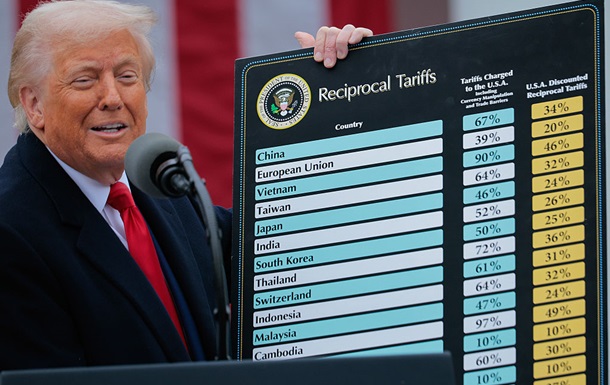China has begun censoring content related to tariffs on social media.
In particular, on the social network Weibo, hashtags and searches for “tariff” or “104” were mostly blocked, and pages displayed an error message.
China has begun blocking some content related to tariffs on social media after the United States imposed “mirror” tariffs against dozens of countries, including a 104% tariff on Chinese goods. At the same time, posts criticizing the United States became the most popular on the network, Reuters reported on Wednesday, April 9.
On the Weibo platform, searches for the words “tariff” or “104” mostly yielded no results – the pages displayed an error message.
Instead, hashtags that mocked the US were trending, including a widely shared theory of a shortage of eggs in the country. State broadcaster CCTV launched the hashtag #USTradeWarIsHardforEggs.
“The US is loudly brandishing the ‘tariff stick’ by imposing tariffs on steel and aluminium from the EU… but at the same time is quietly writing letters to Europeans urgently requesting eggs,” CCTV said.
Censorship has also hit WeChat, where posts by Chinese companies describing the negative effects of the new US tariffs were massively deleted. As Reuters found, all of these posts were marked as “possible to violate laws, regulations or policies.”
Last week, Beijing announced mirror tariffs against the US and promised to “fight economic blackmail to the end.”
At the same time, internet censorship allows sarcastic comments about the US – Chinese social media portrays America as an irresponsible trading partner. This is part of a wider information campaign in which China is preparing to escalate a trade war with the world’s largest economy.
China controls the internet through a system known as the “Great Firewall” and systematically blocks content that contradicts state interests. Foreign social networks such as Instagram or X (formerly Twitter) are blocked in the country – they have been replaced by domestic platforms.
Lawyer Pan Jiulin, with more than 10 million followers on Weibo, noted that China is rapidly reorienting itself from exports to the US to the markets of Vietnam and India, but companies will lose access to the American consumer.
If China retaliates by raising tariffs to 104%, the cost of American goods, including Apple and Tesla, will skyrocket, and Chinese consumers will pay more for their favorite brands.
However, mirror measures may not be very effective: China exports three times more goods to the United States than it imports ($160 billion). But Beijing may resort to this if it believes it can withstand economic pressure better than Washington.
On Monday, the Chinese stock market collapsed – the Shanghai Composite Index fell by 7%, which was the worst result in the past five years. However, the situation stabilized on Wednesday thanks to statements by the state about supporting the markets.
Well-known commentator Hu Xijin said that the Trump team “lost touch with reality.”
“They are waging war not only on the world, but also on the basic norms of human society. Their tariffs will go down in history as a disgrace for future generations,” he said.
As a reminder, US President Donald Trump said he would impose an additional 50% tariff on China on April 9 if Beijing does not remove the 34% tariffs imposed on US products last week.
These Chinese tariffs were imposed in response to the corresponding US tariffs of 34% announced by Trump, which were added to the 20% he imposed earlier this year and led to the average US tariff on Chinese goods rising to 76%.


Hi, this is a comment.
To get started with moderating, editing, and deleting comments, please visit the Comments screen in the dashboard.
Commenter avatars come from Gravatar.